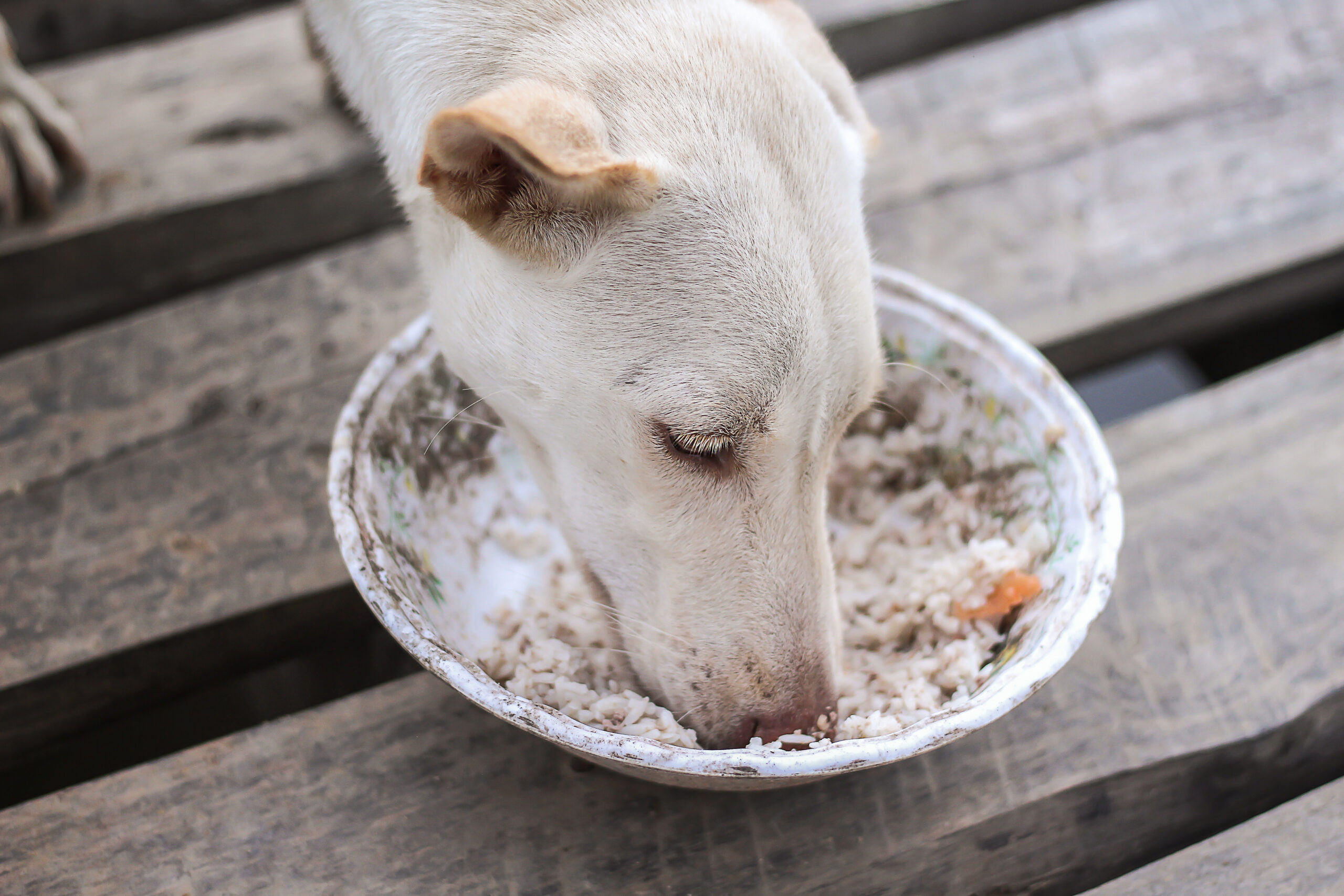My Dog ate Dry Rice [2023] Top Effects
dog ate dry rice – side effects:
If a dog eats dry rice, it’s generally not a cause for immediate concern, as rice itself is not toxic to dogs. However, there are some potential side effects or issues to be aware of:
- Swelling: Dry rice can expand when it absorbs moisture in a dog’s stomach. This expansion could potentially lead to discomfort, bloating, or even a risk of gastric dilation-volvulus (GDV), which is a life-threatening condition where the stomach twists.
- Choking Hazard: If the rice is not properly chewed and swallowed whole, it can pose a choking hazard, especially in smaller breeds or dogs with a tendency to eat quickly.
- Gastrointestinal Upset: Eating dry rice can sometimes irritate a dog’s gastrointestinal tract, leading to symptoms such as vomiting, diarrhea, or abdominal discomfort.
- Dental Issues: Chewing on dry rice grains can potentially cause dental problems, like broken teeth or gum injuries.
- Allergic Reactions: In rare cases, a dog could be allergic to rice, leading to more severe symptoms such as itching, hives, or difficulty breathing.
If your dog has ingested dry rice and is exhibiting any concerning symptoms, it’s best to contact your veterinarian for advice. They can assess the situation and provide guidance on whether any treatment or monitoring is necessary. In most cases, small amounts of dry rice are unlikely to cause serious harm to a dog, but it’s always better to be cautious and seek professional advice when in doubt. Additionally, it’s important to keep potentially harmful foods out of your dog’s reach to prevent accidental ingestion.
what do i do if my dog ate uncooked rice
If your dog has eaten uncooked rice, you generally don’t need to be too concerned. Dogs can digest uncooked rice without much trouble. In fact, rice is often included in some commercial dog foods and is sometimes recommended as a bland diet for dogs with upset stomachs.
However, if your dog has eaten a large quantity of uncooked rice or you suspect they may have consumed something else along with the rice that could be harmful, you should monitor your dog closely for any signs of discomfort or distress. Keep an eye out for symptoms such as vomiting, diarrhea, abdominal pain, lethargy, or any other unusual behavior.
If your dog experiences any of these symptoms or if you are concerned about their well-being, it’s a good idea to contact your veterinarian for guidance. They can provide specific advice based on your dog’s size, the amount of rice eaten, and any other relevant factors. It is indifferent if it was white rice or brown rice. Mush rice is a bit more digestible, however, too much of anything could lead to an upset stomach. or digestive tract.
In most cases, though, a small amount of uncooked rice is unlikely to cause any significant problems for your dog. Just make sure to keep potentially harmful substances out of your dog’s reach in the future to prevent any accidental ingestion.
what can dogs digest?
Dogs have a digestive system that is adapted to process a variety of foods, but not everything is safe or healthy for them to eat. Here’s a general overview of what dogs can and cannot digest:
- Meat: Dogs are carnivores, so they can easily digest and derive nutrients from animal-based proteins like chicken, beef, turkey, and fish. Cooked meats are typically safe for dogs, but avoid feeding them raw meat, which can carry the risk of bacterial contamination.
- Bones: While dogs can digest small, raw bones like those found in chicken or turkey necks, they should not be given cooked bones, as they can splinter and cause choking or internal injuries.
- Fruits: Many fruits are safe for dogs to eat in moderation. Some popular options include apples (without seeds), blueberries, strawberries, and bananas. However, some fruits like grapes and raisins are toxic to dogs and should be avoided.
- Vegetables: Dogs can digest a variety of vegetables, such as carrots, broccoli, peas, and sweet potatoes. These can be fed cooked or raw, but be cautious with very starchy vegetables in large amounts, as they can lead to digestive upset.
- Rice and grains: Plain, cooked rice and small amounts of other grains like oatmeal or quinoa are generally safe for dogs and can help with digestive issues. However, grains should only be a small portion of their diet.
- Dairy: Many dogs are lactose intolerant, meaning they have difficulty digesting lactose, the sugar in milk. While some dogs can tolerate small amounts of dairy, it’s best to avoid giving them milk, cheese, or other dairy products.
- Eggs: Cooked eggs are a good source of protein for dogs and are usually easy to digest. Avoid adding any seasonings or cooking oils when preparing eggs for your dog.
- Dog food: Commercially prepared dog food is formulated to meet the nutritional needs of dogs and is designed to be easily digestible. Choose high-quality dog food that suits your dog’s age, size, and dietary requirements.
- with new food go low (smaller amounts) and slow, waiting to see if there are gastrointestinal issues such as severe diarrhea. So new pet foods may take some time. Do not give up right away.
- Treats: Many dog treats are specifically formulated for dogs and are generally safe for consumption. However, some human foods, like chocolate or foods high in salt or sugar, should never be given as treats.
- Some table scraps: While some table scraps can be given as an occasional treat, it’s important to avoid feeding your dog highly processed, fatty, or spicy foods, as these can lead to digestive upset or more serious health issues.
Always consult your veterinarian before making significant changes to your dog’s diet or introducing new foods, especially if your dog has food allergies, sensitivities, or any underlying health conditions. Additionally, some breeds and individual dogs may have unique dietary needs, so it’s essential to tailor their diet to their specific requirements.
is raw rice dangerous for my dog?
Raw rice itself is not necessarily dangerous for dogs in small quantities, but it’s not an ideal food to feed them. Dogs are primarily carnivorous animals, and their digestive systems are better suited to processing animal protein. While they can eat some grains and carbohydrates in their diet, too much rice, especially in its raw form, can potentially cause digestive issues.
Here are some things to consider:
- Digestive Problems: Raw rice may be difficult for a dog to digest, potentially leading to upset stomach, gas, bloating, or diarrhea. “Dog rice is cooked, but not in large quantities.
- Nutritional Balance: Dogs require a balanced diet that includes protein, fats, and carbohydrates. Feeding them primarily raw rice can lead to nutritional imbalances, as rice alone does not provide all the essential nutrients they need.
- Cooking Rice: If you want to include rice in your dog’s diet, it’s best to cook it thoroughly. Cooked rice is easier for dogs to digest and can be a useful addition to their meals in small quantities. Make sure the rice is plain and not seasoned with any spices, sauces, or additives, as these can be harmful to dogs.
- Consult a Veterinarian: Before making significant changes to your dog’s diet or introducing new foods, it’s always a good idea to consult your veterinarian. They can provide guidance on the best diet for your specific dog’s needs.
In summary, raw rice is not toxic to dogs, but it’s not a recommended or balanced part of their diet. If you want to include rice in their meals, cook it thoroughly and consult your veterinarian for advice on the best diet for your dog’s health and specific dietary requirements.
In summary, rice can be a safe and beneficial addition to your dog’s diet when prepared and fed in moderation. However, it should not be the primary source of nutrition for your dog, and any dietary changes should be discussed with your veterinarian to ensure they meet your dog’s specific nutritional needs.
how to stimulate your dog’s digestion
Stimulating your dog’s digestion is important for their overall health and well-being. Here are some tips to help support healthy digestion in your canine companion:
- Provide a balanced diet: Ensure your dog is eating a high-quality, well-balanced dog food that meets their specific nutritional needs. Consult with your veterinarian to determine the best diet for your dog’s age, breed, and activity level.
- Feed regular meals: Establish a consistent feeding schedule with set mealtimes. Avoid free-feeding, which can disrupt their digestion and lead to overeating.
- Slow down mealtime: Some dogs eat too quickly, which can lead to digestive upset. You can use specialized slow-feed bowls or puzzle feeders to make them eat more slowly.
- Proper portion control: Measure your dog’s food portions according to the feeding guidelines on the packaging. Overfeeding can strain their digestive system and lead to obesity.
- Avoid table scraps: Human food can be hard for dogs to digest and may lead to gastrointestinal issues. Limit or avoid feeding your dog table scraps and be cautious about what foods you share with them.
- Provide fresh water: Make sure your dog has access to clean, fresh water at all times. Proper hydration is essential for digestion.
- Dietary fiber: Include fiber-rich foods in your dog’s diet, such as vegetables like carrots or green beans, or consider adding a small amount of canned pumpkin (not pumpkin pie filling) to their meals. Fiber can help regulate digestion.
- Probiotics: Consult with your vet about the use of probiotic supplements. Probiotics can promote the growth of beneficial gut bacteria and support healthy digestion.
- Regular exercise: Physical activity can help stimulate digestion and promote regular bowel movements. Ensure your dog gets regular exercise appropriate for their age and breed.
- Monitor for food allergies or sensitivities: Some dogs may have food allergies or sensitivities that can cause digestive issues. If you suspect this, consult with your veterinarian for guidance on identifying and managing food allergies.
- Maintain a stress-free environment: Stress and anxiety can impact your dog’s digestion. Provide a safe and comfortable environment and address any sources of stress in their life.
- Regular veterinary check-ups: Schedule regular check-ups with your veterinarian to monitor your dog’s overall health and address any digestive concerns promptly.
Remember that each dog is unique, and what works for one may not work for another. It’s essential to consult with your veterinarian to tailor a digestive care plan specifically for your dog’s needs and any underlying health conditions they may have.

